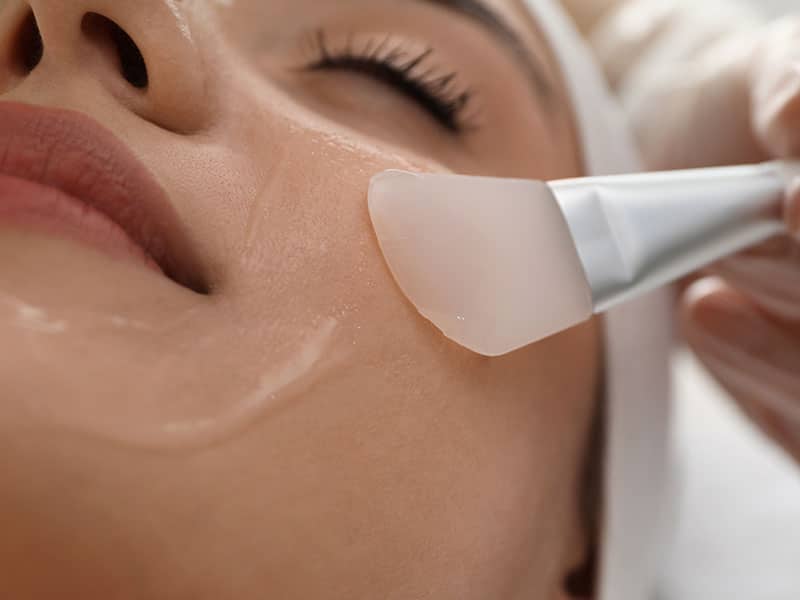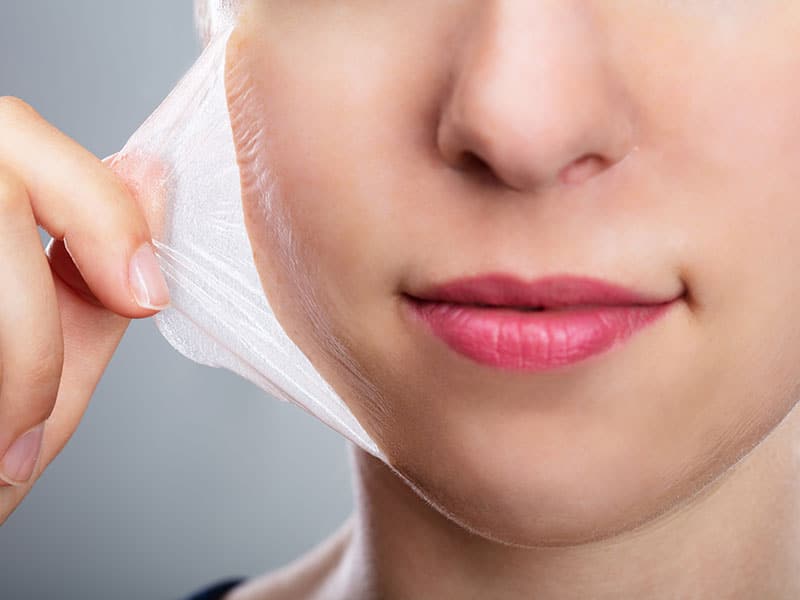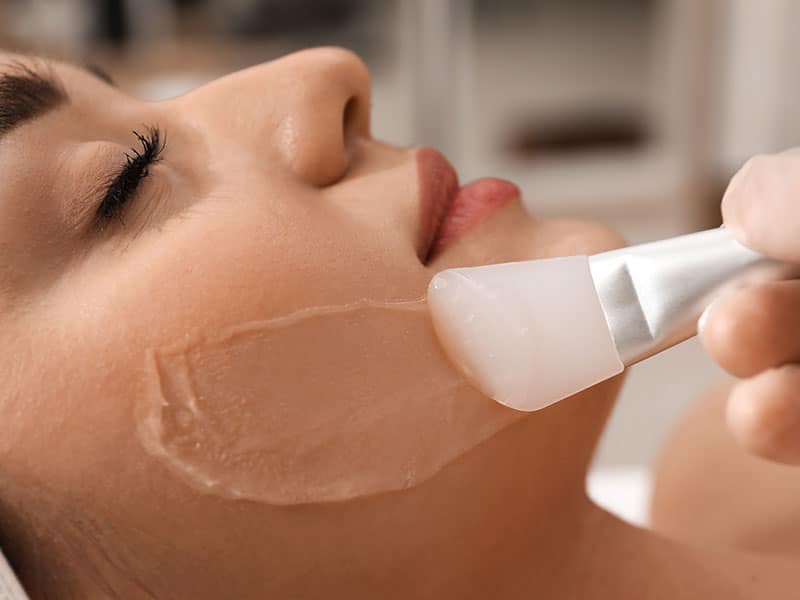Chemical Peel
in New Jersey & Philadelphia
Home » Procedures » Chemical Peel
Bothered by acne scars, sun spots, or rough skin? Our chemical peels in New Jersey and Philadelphia can help smooth your skin, improve tone, and bring back a healthier, fresher look. Dr. Alisa Yamasaki tailors each treatment to fit your skin and your goals.

Experience the Excellence of Dr. Yamasaki, Harvard-Trained Facial Plastic Surgeon.

What Is Chemical Peel?
A chemical peel is a skin resurfacing procedure that uses chemicals to remove the top layers of your skin, revealing the healthier and smoother-looking skin beneath. It works by applying a solution of acids and other chemicals directly to your skin, which causes the outer layers to peel away. Chemical peels can address many different skin issues, such as:
- Rough skin
- Scaly patches
- Sun damage
- Hyperpigmentation
- Fine lines
- And wrinkles
The most commonly used chemical solutions during chemical peel treatments are glycolic acid, trichloroacetic acid (TCA), carbolic acid, and salicylic acid. Each has different strengths and effects, so knowing which is best for you is essential.
Types of Chemical Peels Offered by Dr. Yamasaki
At Yamasaki Facial Plastic Surgery, we provide custom-formulated chemical peels using medical-grade ingredients. Each peel is selected and tailored based on your unique skin type, concerns, and desired results — ensuring safer, more effective outcomes than off-the-shelf or branded solutions.
Superficial /Light Chemical Peel
This gentle peel uses mild acids such as glycolic acid or salicylic acid to exfoliate the outermost skin layer (epidermis). It is ideal for:
Smoothing uneven skin tone
Reducing fine lines and mild textural roughness
Refreshing dull skin without downtime
Best for: First-time peel patients, individuals with sensitive or darker skin, and those seeking regular maintenance treatments.
Medium Chemical Peel
Medium-depth peels penetrate deeper into the skin using solutions like trichloroacetic acid (TCA) or stronger glycolic blends. These target both the epidermis and upper dermis to improve:
Sun damage and pigmentation irregularities
Moderate wrinkles and age spots
Overall skin tone and texture
Best for: Patients ready for more dramatic skin rejuvenation with moderate downtime.
Deep Chemical Peel
Our deepest peel uses phenol or a high-concentration TCA solution to address more significant skin concerns by reaching the mid-dermis. This level of peel helps to:
Dramatically reduce deep wrinkles
Treat longstanding sun damage
Improve the appearance of severe discoloration or scarring
Best for: Carefully selected patients seeking one-time, intensive rejuvenation. This procedure involves longer recovery and is performed with close monitoring for safety.
Dr. Alisa Yamasaki tailors each treatment plan to the patient’s age, skin type, and specific concerns. Results depend on the depth of wrinkles and the amount of sagging skin. For those with significant skin laxity, she may recommend a neck lift to tighten and redefine the jawline, sometimes combined with a facelift or scar revision for more comprehensive rejuvenation.
Chemical Peel Benefits
Chemical peels can help you achieve beautiful, glowing skin. They have various strengths and can be a great option for giving your complexion a rejuvenated look.
Dr. Alisa Yamasaki will ensure your chemical peel process is safe and effective, leaving you with smoother-looking skin.
01
Wrinkle Reduction
02
Deep Cleansing
03
Acne and Scar Vanishing
04
Sun Damage Reversal
Dr. Yamasaki is incredible.
“Dr. Yamasaki & the whole staff was wonderful. They were very organized and took every step to maintain a safe environment. Dr Coons was also very pleasant and diligent when conducting my sound ear test. Overall my experience was very positive and would recommend this ENT office to anyone!”
Chemical Peel in New Jersey & Philadelphia
Dr. Alisa Yamasaki is an experienced and certified Facial Plastic and Reconstructive Surgeon based in New Jersey & Philadelphia. At her practice, Yamasaki Facial Plastic Surgery, she offers clients a range of chemical peels to address the different levels of skin damage caused by aging, sun damage, acne, or other factors. From light to deep exfoliations, her treatments are personalized to meet the needs of each individual.
Chemical Peel Consultation
Before your treatment, you’ll meet with Dr. Alisa Yamasaki for a quick but thorough consultation. Here’s what to expect:
A skin evaluation to assess texture, tone, and problem areas
A review of your medical history, medications, and skin sensitivity
A personalized recommendation for the type and depth of peel
A clear explanation of what to expect before, during, and after treatment
Optional suggestions for combining treatments like fillers or laser, if helpful
You’ll leave with a treatment plan that’s tailored to your skin and goals.
The Ideal Candidate for a Chemical Peel
Dr. Alisa Yamasaki recommends chemical peels for those who address common skin concerns such as wrinkles, discoloration, acne scarring, and sun damage. This treatment works best on individuals with light-to-medium skin tones without significant sun exposure.
It may be recommended that you avoid undergoing a chemical peel treatment if you experience the following:
- A tendency toward abnormal skin scarring
- A darker complexion or skin tone
- A tendency for your scars to experience extra pigmentation
- Used specific acne treatments within one year of treatment (discuss this during your consultation)
- Have more sensitive skin due to skin conditions or medications

Chemical Peel Cost
The type of chemical peel and the number of skin resurfacing treatments required all factor into the cost of chemical peels. During the consultation, Dr. Yamasaki will explain the details surrounding the cost involved in each procedure.
Medical insurance typically does not cover cosmetic procedures such as chemical peels, so patients should discuss payment options with a clinic representative before scheduling their appointment. Yamasaki Facial Plastic Surgery offers payment options through Care Credit.

Chemical Peel Procedure
Dr. Alisa Yamasaki customizes each chemical peel to the individual needs of her patients, ensuring they receive the best possible results. The primary details for each type of peel will vary. Please see below:
Light Chemical Peel Procedure
During a light chemical peel, Dr. Alisa Yamasaki applies a glycolic acid or salicylic acid chemical solution. As the treated area begins to lighten, the patient can experience mild stinging. Once the desired effects of the treatment are achieved, a neutralizing solution is applied to remove the remaining chemical solution.
This type of peel removes the epidermis through gentle exfoliation. It is considered safe to undergo this treatment every 2 to 5 weeks until the patient’s goals are achieved.
Medium Chemical Peel Procedure
During a medium chemical peel, Dr. Alisa Yamasaki applies a trichloroacetic acid chemical. As the whitening begins, the doctor will start to apply cooling compresses to each treated area. For a medium chemical peel, there is no neutralizing solution needed. During the peel, mild stinging and burning may be felt for around 20 minutes.
During a medium chemical peel, the epidermis is removed as well as the top layer of the dermis. The full effects of this treatment may require several peels to be realized.
Deep Chemical Peel Procedure
During a deep chemical peel, Dr. Alisa Yamasaki provides intravenous (IV) fluids while monitoring the patient’s heart rate. To prevent patient discomfort, Dr. Alisa Yamasaki uses local anesthesia. The doctor will apply carbolic acid (phenol), the primary chemical solution for a deep chemical peel, to the skin. The skin will then turn white or gray.
A full deep chemical peel procedure normally takes around 90 minutes, with portions of 15-minute intervals to limit the exposure to the carbolic acid.
During this procedure, the outer skin layer, the upper layer of the dermis, and the middle layer of the dermis are all removed. This is a single-treatment procedure with effects that last up to 10 years.
Recovery from Chemical Peels
Light Chemical Peel Recovery
Medium Chemical Peel Recovery
Deep Chemical Peel Recovery
Patients must follow the aftercare instructions given by Dr. Yamasaki closely to ensure proper healing and recovery. Dr. Yamasaki sees patients in New Jersey & Philadelphia at Yamasaki Facial Plastic Surgery for follow-up visits to monitor the healing process.
BEFORE & AFTER CHEMICAL PEEL
Why choose Dr. Yamasaki
Dr. Alisa Yamasaki is a double board-certified Facial Plastic and Reconstructive Surgeon serving patients in New Jersey and Philadelphia. At her practice, Yamasaki Facial Plastic Surgery, she offers a full range of customized chemical peels designed to address signs of aging, sun exposure, acne, and other skin concerns. Whether patients seek a light refresh or a deeper rejuvenation, each treatment is precisely tailored to restore healthy, radiant skin.
- Renowned Expertise: Board-certified and fellowship-trained, Dr. Yamasaki specializes in facial plastic surgery and advanced skin rejuvenation treatments.
- Prestigious Affiliations: Her background with Penn Medicine, Harvard, and the University of Michigan ensures expert, research-backed care.
- Personalized Patient Care: Every chemical peel is tailored to your skin type and concerns for safe, effective, and natural-looking results.
- Advanced Skin Expertise: With in-depth knowledge of skin health, Dr. Yamasaki selects the ideal peel strength to enhance radiance and minimize imperfections.
- Proven Results: Patients trust Dr. Yamasaki for her meticulous approach and the glowing, refreshed complexion her treatments provide.

Common Chemical Peel Questions
Side effects depend on the type of chemical peel and may include redness, swelling, stinging, and a burning sensation. Patients should expect some light to moderate peeling as the skin heals. It is not a good idea for patients to wear makeup after undergoing a chemical peel as it can cause irritation to the new skin and slow the healing process. Dr. Alisa Yamasaki will provide some tips to minimize the risk of any side effects and ensure that patients have a safe and successful experience with chemical peeling.
Results for light chemical peels can be seen as soon as 7 to 10 days after treatment, while more aggressive treatments take up to three weeks for results to show. Dr. Yamasaki will discuss the expected timeline of results with patients before scheduling their chemical peel.
Depending on the type of chemical peel chosen, the effects of chemical peels typically last around 6 to 8 months but may need to be repeated to maintain the desired results. The results of a deep chemical peel can last for many years with proper skincare and sun protection.
The number of chemical peel sessions depends on the depth of treatment and your individual skin concerns. While a single deep peel may produce long-lasting results, light and medium peels often require a series of treatments spaced a few weeks apart to achieve and maintain optimal results. During your consultation, Dr. Yamasaki will recommend a personalized treatment plan based on your goals and skin type.
Yes. Chemical peels are frequently combined with other facial treatments such as dermal fillers, laser resurfacing, or microneedling for more comprehensive skin rejuvenation. Combining treatments can target multiple layers of the skin, enhancing both texture and volume. Dr. Yamasaki will guide you on the safest and most effective combinations based on your unique skin profile.
To ensure safe and effective results:
Before your peel, avoid using retinoids, exfoliants, or other strong active ingredients for several days.
After your peel, protect the treated area from sun exposure, skip makeup until fully healed, and follow a gentle skincare routine.
Dr. Yamasaki will provide detailed pre- and post-care instructions tailored to the depth of your peel and your skin’s needs.
Most patients describe chemical peels as mildly uncomfortable rather than painful. Light peels may cause a slight tingling or stinging sensation, while medium and deep peels can involve a burning or tightening feeling during the procedure. For deeper peels, Dr. Yamasaki may use local anesthesia or other comfort measures to ensure your experience is as pleasant as possible.
Yes — but with special care. Individuals with darker skin tones can be more prone to hyperpigmentation if the wrong type of peel is used. That’s why Dr. Yamasaki selects peels and ingredient strengths specifically designed for safe use on melanin-rich skin, minimizing risks while achieving beautiful results. A consultation is essential to customize a safe and effective treatment plan.
Chemical peels can be an excellent option for those looking for an affordable skin resurfacing option that is decided to improve their skin tone and texture. Dr. Yamasaki can help you decide if this facial treatment is right for you during your consultation.